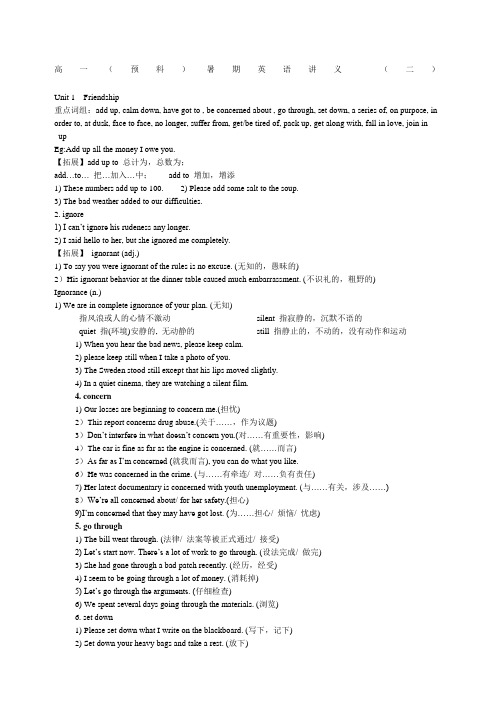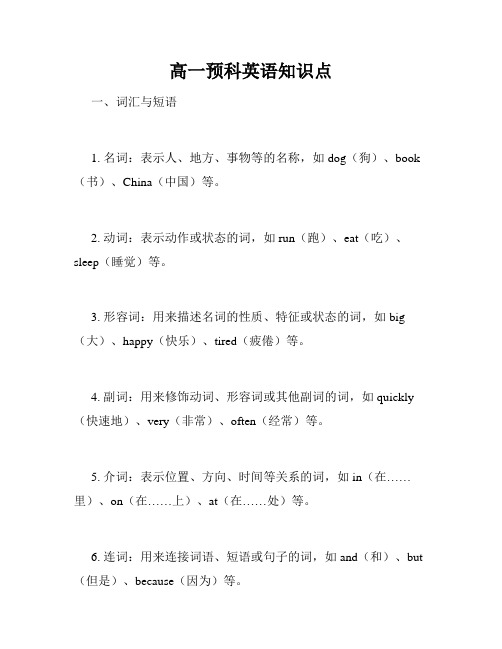高一英语预科讲义五 补习班同步
- 格式:docx
- 大小:22.53 KB
- 文档页数:4

2018-2019版英语高一、高二同步系列课堂讲义教版(通用)必修1Unit 5 Part Ⅱ金先生所工作的公司的老板听到了这起事故。
(in the boss’ company)3.根据句子的意思来选择。
The colorless gas without which we cannot live is called oxygen.这种无色的、离了它我们就无法生存的气体是氧气。
4.表示“所有”关系或“整体中的一部分”时,通常用介词of。
I have about 10 books,half of which were written by Mo Yan.我有大约10本书,其中一半是莫言写的。
[名师点津]在定语从句中,有一些含介词的动词短语不可拆开使用,如look after,look for等不能把介词移至which或whom之前。
Ⅰ.用正确的关系词或“介词+关系代词”填空1.I still remember the day when/on__which this country became independent. 2.The house where/in__which he lived 10 years ago has been pulled down.3.I will never forget the day when/on__which we first met.4.This is the reason why/for__which he refused our offer.5.The man with__whom I talked just now is my brother.Ⅱ.单句改错(每小题仅有1处错误)1.This is the house which I lived last year.which→where2.The old woman with who you talked just now is a famous artist.who→whom 3.The reason why he explained to us is quite clear.why→that/which4.He has three sons, two of who are teachers.who→whom5.Is this the car for that you paid a high price?that→whichⅢ.用定语从句完成句子1.The factory where/in__which__he__works (他工作的) is the largest one in this city.2.The day when/on__which__his__father__returned(他父亲回来) from abroad is the happiest day in the boy’s lif e.3.I don’t know the reason why/for__which__he__was__absent__today (他今天缺席的).4.Is this the reason why/for__which__he__refused__to__come__here (他拒绝来这里的)?5.I’ve never been to the small villag e where/in__which__my__father__had__worked__for__five__years (我父亲工作5年的) before he went to college.6.I still remember the day when/on__which__I__first__came__to__this__school (我第一次到这个学校).7.What’s the name of the place where/in which you spent your holiday last year (去年你度假的)?8.The reason why/for__which__he__was__late__for__class (他上课迟到的) is that he got up late.。

高一(预科)暑期英语讲义(二)Unit 1 Friendship重点词组:add up, calm down, have got to , be concerned about , go through, set down, a series of, on purpose, in order to, at dusk, face to face, no longer, suffer from, get/be tired of, pack up, get along with, fall in love, join in upEg:Add up all the money I owe you.【拓展】add up to 总计为,总数为;add…to… 把…加入…中;add to 增加,增添1) These numbers add up to 100. 2) Please add some salt to the soup.3) The bad weather added to our difficulties.2. ignore1) I can’t ignore his rudeness any longer.2) I said hello to her, but she ignored me completely.【拓展】ignorant (adj.)1) To say you were ignorant of the rules is no excuse. (无知的,愚昧的)2)His ignorant behavior at the dinner table caused much embarrassment. (不识礼的,粗野的)Ignorance (n.)1) We are in complete ignorance of your plan. (无知)指风浪或人的心情不激动quiet 指(环境)安静的, 无动静的silent 指寂静的,沉默不语的still 指静止的,不动的,没有动作和运动1) When you hear the bad news, please keep calm.2) please keep still when I take a photo of you.3) The Sweden stood still except that his lips moved slightly.4) In a quiet cinema, they are watching a silent film.4. concern1) Our losses are beginning to concern me.(担忧)2)This report concerns drug abuse.(关于……,作为议题)3)Don’t interfere in what doesn’t concern you.(对……有重要性,影响)4)The car is fine as far as the engine is concerned. (就……而言)5)As far as I’m concerned (就我而言), you can do what you like.6)He was concerned in the crime. (与……有牵连/ 对……负有责任)7) Her latest documentary is concerned with youth unemployment. (与……有关,涉及……) 8)We’re all concerned about/ for her safety.(担心)9)I’m concerned that they may have got lost. (为……担心/ 烦恼/ 忧虑)5. go through1) The bill went through. (法律/ 法案等被正式通过/ 接受)2) Let’s start now. There’s a lot of work to go through. (设法完成/ 做完)3) She had gone through a bad patch recently. (经历,经受)4) I seem to be going through a lot of money. (消耗掉)5) Let’s go through the arguments. (仔细检查)6) We spent several days going through the materials. (浏览)6. set down1) Please set down what I write on the blackboard. (写下,记下)2) Set down your heavy bags and take a rest. (放下)3) The bus driver set her down at the corner.(让某人下车)【拓展】set off "动身,启程";※set about "开始,着手" ;set out "出发,开始" ;set up "建立;创办";set an example to... 为树立榜样;set sail 启航9. settle1) After years of travel, we decided to settle here. (定居)2) The bird settled on a branch. (停留)3) It’s time you settled your dispute with him. (解决,处理)settle down1) She settled down in an armchair to read her book. (舒适地坐或躺)2) She is settling down well in her new job. (过更安定或宁静的生活;习惯于新的生活方作等) 10. recover1) He has now fully recovered from his stroke. (痊愈)2) I’m slowly recovering my strength after a bad flu. (恢复)3) recover stolen goods / lost property (重新找到) recovery (n.)12. Another time some months ago, I happened to be upstairs at dusk when the window was open. 还有一次,就在五个月前的一个晚上,我碰巧在楼上,窗户是开着的。

初高中英语衔接班讲义年新高一的同学们,进入高一以后有时会感到所学知识复杂、繁琐、易忘。
面对这种困惑,我希2014江苏省黄桥中学的度80望同学们首先要明白:学英语是一个漫长的过程,走走停停便难有成就。
要有连续性、持续性。
比如烧开水,在烧到时停下来,等水冷了又烧,没烧开又停,如此周而复始,又费精力又费电,很难喝到水。
学英语要一鼓作气。
天天坚持,在完全忘记之前及时复习、加深印象,如此反复,直至形成永久性记忆。
如果等到忘记了再来复习,就像又学新知识一样,那有大量的却难品味到其甘润。
所以希望同学们在平时的学习中除了要么,我们就永远是初学者,虽然在辛辛苦苦地烧开水,强大的自我约+,还要有一种归纳、比较、错题整理、仔细推敲、理解的过程,所以我坚信:投资我们的时间和心智词汇量学习习惯,基本常识,解题技巧。
成功!在这里我只谈谈高中生对英语的束力+我们实际行动和信心=如何玩转高中英语学习?——养成良好的学习习惯!a. 提前做好预习(疏通单词和短语,熟读课文,做好各种标记),课后及时复习(背诵词汇,背诵课文,高效完成练习,进行有效的错题整理)(切忌:考前抱佛脚或者因考而学)b. 加强学习的自主性并逐步完善适合自己的学习方法,合理分配学习时间,有计划有步骤。
(切忌:过度依赖老师或者被动式学习)(听说读写每天都要得到落实)(建议买一本高考词汇书,记忆大量的词汇)c. 多反思,多总结,既要有充分地练习更要跳出练习进行归纳和思考。
高中英语学习的方法一般说来,初中属于知识型学习;而高中属于应用型学习。
因此,在初中,同学们只要熟记了课本中的单词、掌握了语法的条条框框,考试中就能得高分,甚至满分。
然而,高中英语就不一样,哪怕你熟记了所有的单词、短语和语法规则,但是考试中不一定能得高分。
因此,同学们在高中必须改进英语学习方法,那么究竟该怎样学习呢?在此提出一些建议供大家参考:一、背诵是学好英语的基础要学好一门语言,背诵是必须的。
同学们不仅要背诵英语词汇、短语及语法规则,而且还要背诵大量的英语句子、短文。

高一英语讲义(预科)课程概述本讲义旨在帮助高一学生打好英语基础,提升听、说、读、写的能力。
通过系统研究英语语法、词汇和句型,以及大量阅读和听力练,学生将能够更加流利地表达自己,理解并回答各种英语问题。
课程目标1. 提高学生的听力理解能力,培养对英语语音和语调的敏感度。
2. 提升学生的口语表达能力,培养他们自信地用英语进行日常对话。
3. 帮助学生扩大词汇量,掌握常用的英语词汇,并能正确运用于写作和口语表达中。
4. 强化学生的阅读理解能力,培养他们独立阅读并理解各类英语文本的能力。
5. 培养学生良好的写作惯,引导他们写出逻辑清晰、表达准确的英文文章。
课程大纲Unit 1: 基础单词和短语- 掌握100个常用英语单词和短语,了解其用法和搭配。
- 运用这些单词和短语进行基础的句子构建和对话练。
Unit 2: 语法基础- 理解并研究英语的基本语法规则,包括时态、语态、名词、代词、形容词、副词等。
- 运用所学语法知识进行简单的句子分析和构建。
Unit 3: 听力训练- 听取各类英语录音材料,理解并获取关键信息。
- 完成听力练,提高听力理解能力并培养听力技巧。
Unit 4: 口语表达- 研究常用的口语表达方式,如问候、介绍、询问和回答问题等。
- 进行口语练,提高口语流利度和语感。
Unit 5: 阅读理解- 阅读各类英语文章,包括新闻报道、故事、科普文章等。
- 理解文章内容,回答相关问题,提高阅读理解能力。
Unit 6: 写作技巧- 研究写作的基本要素,如文章结构、段落组织、句子连接等。
- 进行写作练,培养写作惯和写作技巧。
参考资料- 《高中英语教程》- 《高中英语综合教程》- 在线英语研究网站和应用程序- 英语辅导练书籍和题集以上是《高一英语讲义(预科)》的简要概述,我们将通过系统学习和练习,帮助学生逐步提高英语能力,为将来更深入的英语学习打下坚实的基础。

高一预科英语知识点一、词汇与短语1. 名词:表示人、地方、事物等的名称,如dog(狗)、book (书)、China(中国)等。
2. 动词:表示动作或状态的词,如run(跑)、eat(吃)、sleep(睡觉)等。
3. 形容词:用来描述名词的性质、特征或状态的词,如big (大)、happy(快乐)、tired(疲倦)等。
4. 副词:用来修饰动词、形容词或其他副词的词,如quickly (快速地)、very(非常)、often(经常)等。
5. 介词:表示位置、方向、时间等关系的词,如in(在……里)、on(在……上)、at(在……处)等。
6. 连词:用来连接词语、短语或句子的词,如and(和)、but (但是)、because(因为)等。
7. 数词:表示具体数量的词,如one(一)、two(二)、three (三)等。
8. 句型:句子的结构和语法形式,用来表达特定的意思或句子间的关系。
二、语法知识点1. 一般现在时:表示经常性或固定的动作,用动词的原形形式,如I play basketball on weekends(我周末打篮球)。
2. 进行时态:表示正在进行的动作,由be动词加动词-ing形式构成,如He is studying in the library(他正在图书馆学习)。
3. 定冠词与不定冠词:定冠词the用于特指某物或某人,不定冠词a/an用于泛指某物或某人,如I have a book(我有一本书)。
4. 人称代词:用来代替特定人或物的代词,如I(我)、you (你)等。
5. 疑问句:用于询问信息、意见或建议的句子,通常以助动词或疑问词开头,如What is your name?(你叫什么名字?)。
6. 形容词比较级与最高级:用来对两个或多个名词或代词进行比较的形容词形式,如big(大)- bigger(更大)- biggest(最大)。
7. 介词短语:由介词和名词、代词、动名词等组成,用来表示关系、方位、方式等,如in the park(在公园里)、by car(乘坐汽车)。

人教版高中英语必修1同步复习辅导精讲全册讲义目录Unit1 Friendship(一)Unit1 Friendship(二)Unit1 Friendship(三)Unit2 English around the world(一)Unit2 English around the world(二)Unit3 Travel journal(一)Unit3 Travel journal(二)Unit4 Earthquakes(一)Unit4 Earthquakes(二)Unit5 Nelson Mandela-a modern hero(一)Unit5 Nelson Mandela-a modern hero(二)Friendship(一)本讲目标Are you good to your friend?Do the following survey.Add up your score and see how many points you get.题一:All his schooling ______ no more than one year.A. added upB. added up toC. added toD. added onThe engine of the ship was out of order and the bad weather _____ the helplessness of the crew at sea.A. added toB. added upC. added up toD. made up 题二:There have been several new events _____ to the program for the 2008 Beijing Olympic Games.A. addB. to addC. addingD. added______ hunting animals and birds for food, Kooris gathered roots and nuts.A. Because ofB. ExceptC. In additionD. In addition toYour friend asks to borrow your favorite camera. When he/she borrowed it last time, he/she broke and you had to get it repaired.题三:—— Excuse me, where is Room 301?——Just a minute. I’ll get B ob ____you to your room.A. shownB. showsC. to showD. showing—— Excuse me, where is Room 301?——Just a minute. I’ll have Bob ____you to your room.A. showB. showsC. to showD. showingYour friend comes to school very upset. The bell rings so you need to go to class. Will you ignore the bell and go somewhere quiet to calm you r friend down?题四:Mary failed in the exam so she ________.A. upsetB. feel upsetC. was upsetD. was upsettingI hope I haven’t said anyt hing _________ you.(=get you ________)A. upset `B. upsettedC. to upsetD. upsetly题五:The ___ sea gave no hint of the storm that was coming.A. stillB. quietC. silentD. calmPlease keep ___ while I take your photograph.A. stillB. quietC. silentD. calmThis hospital lies in a ______street.A. stillB. quietC. silentD. calmHe was ___ for a moment, and then began his answer.A. stillB. quietC. silentD. calmTell your friend you are concerned about him/her and you will meet after class and talk then.题六:Tell your friend you are concerned about him/her and you will meet after class and talk then._______, you can stay the whole summer.A. Whoever it concernedB. As far as I’m concernedC. As you are concernedD. Concerning you and meThis novel is concerned ____ the Second World War, while most teenagers are more concerned _____ the hero’s love story.A. with; forB. with; withC. for; aboutD. about; withYou are taking your end-of-term exam. Your friend, who doesn’t work hard, asks you to help him/her cheat in the exam by looking at your paper. You will tell him/she should have studied, so you don't let him/her look at your paper.题七:The weather turned out to be fine yesterday. I _________ the trouble to carry my umbrella with me.A. should have takenB. could have takenC. needn’t have takenD. mustn’t have taken—The weather has been very hot and dry.—Yes. If it had rained even a drop, things would be much better now! And my vegetables___.A. wouldn’t dieB. didn’t dieC. hadn’t diedD. wouldn’t have diedFriendship(一)讲义参考答案题一:B;A 题二:D;D 题三:A;A 题四:C;C 题五:D;A;B;C 题六:B;A 题七:C;Dfriendship(二)重难点精讲Do you want a friend whom you could tell everything to, like your deepest feeling and thou ghts? Or are you afraid that your friend wo uld laugh at you, or wouldnot understand what you are going through.go through1. =experience; suffer经历,经受 1. He went through the hardest time with his wife.2. 完成,做完 2. I’ve gone through much work so I want to rest.3. 检查,仔细查看 3. The teacher has gone through all the papers.4. 通过(考试、议案) 4. He has gone through the end-of-term exam.题一:The police _____ the building hoping to catch the chief.A. looked forB. searched forC. found outD. went throughI wonder if it’s because I haven’t been able to be outdoors for so long that I’ve grown so crazy about everything to do with nature.I wonder 表示“我想知道”时,后面一般不跟that引导的从句。
学员编号:年级:高一课时数:学员姓名:辅导科目:英语学科教师:授课类型T同步巩固 C 现在分词 C 阅读巩固授课日期时段教学内容词汇key words & expressions :Foreign Language Learning1、犯罪,犯法1、offend the law2、与其…宁愿2、prefer to do… rather than do…3、被尊重的感觉3、a sense of being respected4、企图做…4、attempt to do something/make an attempt to do something5、尊敬某人/ 某事(respectful) 5、be respectful to/ towards sb.be respectful of sth.6、把重点放在……6、lay/put/ place emphasis on…7、进入这个行业7、enter the profession8、性别问题新邮票的发行提出一个新的重要议题8、issue of genderthe issue of the new stampraise a new issue9、技术术语9、technical term10、忙着做某事(occupied)10、be occupied in doing sth./ with sth.11、一本很容易的书11、a fairly easy book12、恰当地使用英语的范围不仅仅限于性别方面。
12、Using English properly extends further than gender.13、随时代变化而变化13、change with the times14、飞机上的空中服务员14、flight attendant15、坚持,坚决要求15、insist on sth./doing sth./ that…(should)16、(法律、协议)要求或强迫某人做某事对……很感激16、oblige sb. to do sth.be obliged to sb. for sth.17、不和时宜17、out-of-date18、不再流行18、out of style现在分词学习非谓语动词包括动词不定式、动名词、动词现在分词和过去分词四种。
高一年级衔接班讲义第一课时为什么要上衔接班?(1)初中和高中的差异:1教材跨度大.与初中简单的基础英语相比,高中英语容量大,要求高,节奏快,这就致使很多学生一时难以适应。
其实从高中英语的设置和心理学上分析,我们不难找到答案.初中生升到高中,都有一种兴奋的心情。
但在看到越来越多的新单词,越来越长的课文后;在听到越来越快的听力语速后;在碰到越来越复杂试题后,在老师的全英文授课的"熏陶"下,他们中的一些人不免会产生畏难的情绪,有的人就觉得自己不是学英语的料,干脆就不学了。
其实这部分学生不是不想学,而是觉得高中的英语教材与课堂与初中太不一样了,就错误的认为自己没得救了,这就好比吃惯了中餐的人会觉得西餐很难吃,而导致不愿意吃一样。
2.初高中英语教法有所不同.初中时候,学生习惯于老师用汉语解释英文,不习惯高中老师全英语教学,教师课堂常用语掌握太少;初中生习惯于老师对课文逐句翻译, 不习惯对课文篇章理解和深层理解;初中生习惯于老师教读生词,不习惯自己拼读,缺乏一定的音标知识;初中生习惯于听老师简单重复操练, 不重视思维能力的培养和语言的综合运用能力.。
(2)对策:1教材跨度大.未雨绸缪,衔接班为初高中英语搭桥。
2.初高中英语教法有所不同。
打牢基础,以不变应万变;主动适应环境,而不是让环境适应你。
3.考试内容不一样。
知己知彼,百战不殆。
一、凡事预则立不预则废和你一起迈好第一步——辅导计划详解1.语音攻略大胆读出来出错越多进步越大2. 单词攻略a.单词的重要性:b.记哪些单词:c. 如何记单词:谐音法university math ambition pest amaze词根词缀法press press urecom pressde presseddepress ionex pressexpress ionim pressimpress ionimpress iveop pressspect in spectre spectex pectsus pecta spectspec iale speciale specia lly联想法tend 伸展in tendattendance 在十舞蹈at tendex tend 一枝红杏出墙来pre tendcon tend3.语法攻略:从句4.阅读攻略:5.写作攻略:6.听力攻略:练习写出下列单词的汉语意思press ure com press de pressed depress ion ex press express ion im press impress ion op press impress ive in spectre spectex pectsus pecte specia lly spec iale speciaa spectin tend attendance at tend ex tend con tend pre tend第二-三课时一、语法精讲第一讲对句子的认识零、基础知识还原1.十大词类名词----------表示人或事物的名称形容词-------表示人或事物的特征副词----------修饰动词、形容词、或其他副词动词----------表示动作或状态代词----------代替名词、数词数词----------表示数量或顺序冠词----------限制名词的意义介词-------表示名词、代词和其他词的关系连词-------连接词与词或句与句感叹词-----表示说话时的感情或语气一、按句子的结构可分三种:1)简单句:只有一个主语(或并列主语)和一个谓语(或并列谓语)。
高一预科班英语讲义Trust yourself~~~~~Be strickt with yourself!!!!!!!!!目录2009年辽宁高考英语大纲…………………………………………………………… 2008年英语高考试题语法分类精粹………………………………………………… 冠词名词(主谓一致)代词形容词、副词介词动词时态、语态非谓语动词情态动词、虚拟语气动词辨析动词词组定语从句名词性从句状语从句倒装句强调句插入、省略句情景交际语法综合测试———2009年全国统一考试(辽宁卷)(北京卷)……………………… 2008年高考英语完型精选解读……………………………………………………………… 2008年高考英语阅读精选分析………………………………………………………………… 高考写作秘籍………………………………………………………………………………….. 范文赏析高一英语词汇之疯狂记忆宝典…………………………………………………………………. 高考英语听力攻克方略——趣味英语…………………………………………………………………………2009年辽宁高考英语大纲1 铭师讲堂高中专业辅导学校地址:油田实验中学西侧鑫海电子城三楼电话:7888631Trust yourself~~~~~Be strickt with yourself!!!!!!!!! I(考试性质(2)使用一定的句型、词汇,清楚、连贯地表达自普通高等学校招生全国统一考试是由合格的高中己的意思。
毕业生和具有同等学力的考生参加的选拔性考?(考试形式与试卷结构试。
高等学校根据考生的成绩,按已确定的招生1(答卷方式:闭卷、笔试。
计划,德、智、体全面衡量,择优录取。
因此,2考试时间:120分钟。
试卷满分为150分。
3(题高考应有较高的型:试卷一般可包括多项选择题、完形填空题、信度、效度,适当的难度和必要的区分度。
英语听力填空题、短文改错、书面表达等题型。
4(试。
专题一:动词的时态考点:一般现在(过去,将来)时现在(过去)进行时现在(过去)完成时过去将来时一般现在时一般现在时:经常性① + 现时的状态②①ⅰ The earth moves around the sun.ⅱ高考题:Look at the timetable. Hurry up! Flight 4026 _______ off at 18:20.A. takesB. tookC. will be takenD. has taken② He is at the door.特殊用法:1. We’re not sure if it _______ tomorrow. If it _______,we won’t climbthe South Hill.A. will snow , snowsB. will snow , will snowC. snows , snows D snows , will snow2. No decision _______ about any future appointment until all thecandidates have been interviews.A. will be madeB. is madeC. is being madeD. had been made一般过去时一般过去时:过去所发生的事情或存在的状态通常与具体的表示过去的时间状语连用Notice: 一般过去时与一般现在时不发生关系Mr. White _______ in this factory, but no any longer.A. had workedB. has workedC. used to workD. used to working一般将来时一般将来时:将来发生的动作或存在的状态Will/shall + 动词原形通常与具体的表示将来的时间状语连用① be going to② be to doⅰ意图(按计划安排即将发生的动作)ⅱ应该:(高考例句)I feel that it is your husband who is to be punished.③ be about to doⅰ“即将”: 不能与具体的时间状语连用ⅱ判断:Miss Liu is about to leave the office at 5 p.m.Let’s keep to the point or we _______ any decisions.A. will never reachB. have never reachedC. never reachD. never reached现在进行时现在进行时:现在或现阶段正在进行的动作ⅰ现在:ⅱ现阶段:is/am/are + doing表示的是一种暂时性Notice: 注意与被动的结合:is being doneWould you please keep silent? The weather report _______ and I want to listen.A. is broadcastB. is being broadcastC. has been broadcastD. had been broadcast特殊用法:一些表示位移的或者是短暂性的动词,如:come,go,leave,arrive,start,die等用现在进行时态表示一个即将发生的动作。
高一英语(预科)讲义五Unit 1 Friendship单元总结 2015/7/19I. Background knowledge (背景知识)The Jews in World War ⅡIn 1933,the Jewish population of Europe stood at over nine million.Many European Jews lived in the countries that Nazi Germany would occupy or influence.By 1945,nearly two out of every three European Jews had been killed as part of the “Final Solution”,which was the Nazi policy to murder all the Jews of Europe.II.Enlarge your vocabularysociable,honest,friendly,easygoing,nervous,open-minded,anxious,careful, talented,talkative,nosy,thoughtful,generous,carefree,pessimistic,peaceful,optimistic,interesting,reliable,helpful,active,careless,caring,exact,adventurous,imaginative,hotblooded,well-organized,trustworthy,patient,responsible,outgoing,kind,brave,warmhearted,selfless,tolerant,etc.II. Make a list of reasons why friends are important to you.(speaking ability) (1) to cope with stressful situations in life;to share my worries and secrets in my inner world;to show my concern for other people;to let other people share my happiness;to unfold to other people the secrets in my heart (to name but few)etc.(2)Summarize the general idea of each paragraph(概括每段的大意)Para 1:Anne made her diary her best friend whom she could tell everything to. Para 2:Anne’s diary acted as her true friend during the time she and her family had to hide away for a long time.Para 3:Having been kept indoors for so long,Anne grew so crazy abouteverything to do with nature.直接引语和间接引语(Ⅰ)1.下列情况下,直接引语变间接引语时时态不变。
(1)直接引语如果陈述的是客观事实或真理,当其变为间接引语时,不管主句用什么时态,间接引语的时态都不变。
The teacher told the students,“The earth goes around the sun.”→The teacher told the students that the earth goes around the sun.(2)直接引语中有明确的表示过去时间的状语时,变间接引语时,其时态仍保持过去时。
The girl said,“I was born in Hong Kong in 1990.”→The girl said that she was born in Hong Kong in 1990.(3)主句的谓语动词是一般现在时或将来时,变间接引语时,时态通常不变。
The old gentleman often says,“Time is life.”→The old gentleman often says that time is life.2.人称代词的变化(1)“一随主”。
若直接引语中有第一人称,变间接引语时应与主句中主语的人称相一致。
(2)“二随宾”。
若直接引语中有第二人称,变间接引语时应与主句中宾语的人称相一致。
(3)“第三人称不更新”。
直接引语中的第三人称变间接引语时不需要变化。
3.疑问句直接引语变间接引语(1)直接引语为一般疑问句,变成间接引语时,常用if或whether引导,引述动词用asked,没有间接宾语的可以加一个间接宾语me,him 等。
He asked me,“Are you good at English?”→He asked me if/whether I was good at English.(2)特殊疑问句变间接引语时,用原句中的疑问词作连词,将句子改为陈述语序。
The teacher asked the boy,“Why are you late again?”→The teacher asked the boy why he was late again.4.直接引语变间接引语时,还要注意几种特殊情况:(1)陈述句由直接引语变为间接引语时,如果有两个或两个以上的宾语从句并列时,仅能省略第一个 that,其余的均不可省略。
He said,“I want to visit the Great Wall,and my father will go with me then.”→He said (that) he wanted to visit the Great Wall and that his father would go with him then.(2)直接引语是祈使句时,变间接引语时常变为ask/tell/order sb.to do sth.句型。
如果是以let’s开头的祈使句,则通常变为suggest doing 或 suggest+that 从句。
“Do it again.”the teacher said to us.→The teacher told us to do it again.(3)直接引语中有when,since,while引导的从句,在变为间接引语时,只改变主句的时态,从句的时态不变。
(4)如果在当地转述,here不必变为there,come不必变为go;如果在当天转述,则today, yesterday,tomorrow等时间状语也不必变化。
(5)有的疑问句并非提出疑问,而是表示请求、建议、劝告等意义。
引述这类疑问句时,通常用“ask/advise/want+宾语+不定式”的结构,表示建议时,通常用“suggest+动名词”等结构。
Ⅱ.把下列直接引语变为间接引语或间接引语变为直接引语1.“We’ve lived there for two years,”he told me.2.“I was here a few weeks ago,”she said.3.“I went to university in the 1960s,”Wang Hua told his students.4.The teacher asked Wang Ying why she hadn’t gone to school the day before. Section Four Using Language Language Points1.I am having some trouble with my classmates at the moment.目前我和我的同学有矛盾。
have trouble with sth.意为在某方面有困难/麻烦,其中trouble为不可数名词,也可换为difficulty。
have trouble with...某人/某事使人伤脑筋、苦恼;跟(某人)闹别扭have difficulty with sth.=have trouble with sth.在……方面有困难/麻烦have difficulty/trouble (in) doing sth.在……方面有问题/困难have problems/a problem with sth.在……方面有问题He had no difficulty (in) working out the problem. 他没有费事就做出了那道题。
(1)She’s had a lot of trouble with her husband (跟丈夫闹意见).(2)I’m sorry you are having trouble in making friends (在交友方面有麻烦).2. I’m getting along well with a boy in my class.我和我班的一个男生相处得很好。
The girl is difficult to get along with.这个女孩很难相处。
I can get along well with my classmates.我能和同学们融洽相处。
—How are you getting along with your studies?——你的功课学得怎样?—Very well.——很好。
get along with意为与……相处;某事进展得……,其中along也可换为on,其后可用 well,nicely,badly等修饰语,表示同某人相处得好(不好),某事进展得(不)顺利。
3. They say that this boy and I have fallen in love.他们说我和这个男生在谈恋爱。
They fell in love with each other three years ago. 三年前他们相爱了。
fall in love with sb.意为与……相爱,其表瞬间的动作,即该动作非延续性,在肯定句中不能与表示一段时间的状语连用。
be in love with sb.爱上某人,表状态,动作可延续The girl has been in love with Tom for three years.这女孩与Tom相爱三年了。